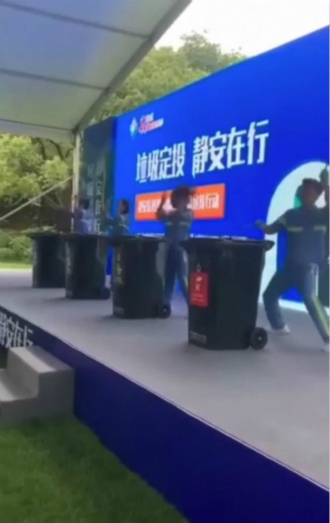

This July clocks an era-defining moment for Shanghai, one of the world’s biggest mega cities, who must now rack their brains trying to figure out if crayfish or corn cobs should be categorized as wet or dry trash.
Garbage-sorting has become of the most searched buzzwords on Chinese social media, even trending in local chat groups.
Nearly 23 million residents in Shanghai have joined the bandwagon in support of slashing the city’s mounting garbage challenge, as new garbage-sorting regulations come into full effect citywide on Monday.
And the reactions of local residents to this green overhaul are dazzling.
For example, some handy dance moves have been created to teach people about the basics of how to sort and dump trash bins like a pro.
In a trending video clip on social media, the instructors perform a drum-beating show on stage in much-exaggerated body movements, with finger-popping lyrics showing the community whether eggshell or leftovers should be categorized as wet or dry waste.
Meanwhile, some residents are using playing cards to identify trash categories, with spades representing dry waste, hearts for hazardous waste, clubs for wet trash, and diamonds for recyclables.
Many commuters in Shanghai, however, are unable to dump trash bins in the “designated spots” in “designated time”, according to the new regulations, as some of the garbage collection schedules and spots can be fixed.
Such a dilemma has even given rise to a new business: Shanghai residents are hiring people to help them rummage through their waste bins for those who are less capable to sort their trash or who cannot show up at the allowed time.
Residents are also encouraged to tip off authorities by calling a hotline or via the WeChat account “Where is Trash Going” if they spot mixed collection or transportation of already sorted trash, Deng Jianping, director of Shanghai Greenery and Public Sanitation Bureau, told Xinhua.
China is now getting ready to roll out the garbage-sorting plan nationwide, from beefing up infrastructure to initiating incentives.

In a trending video clip on social media, the instructors perform a drum-beating show on stage in much-exaggerated body movements, showing the community whether eggshell should be categorized as wet or dry waste.
According to Shanghai’s mandatory garbage-sorting regulations, individuals who refuse to manage waste can face a fine of up to 200 yuan ($29), while firms and other companies can receive a penalty of 50,000 yuan ($7303).
Shanghai has already installed more than 13,000 garbage-dumping spots in residential areas citywide, covering 75% of the residential communities, and replacing more than 40,000 trash cans along the streets for different types of waste, according to the Shanghai Greenery and Public Sanitation Bureau.
Shanghai is taking the lead in introducing a waste sorting system, which will become the nationwide standard. Following Shanghai, another 45 cities in the Chinese mainland will introduce similar regulations, including Beijing, Shenzhen, and Guangzhou. Forty-six Chinese cities will invest 21.3 billion yuan to build waste sorting and recycling systems by the end of 2020, Xinhua reported.
 Fire brigade in Shanghai holds group wedding
Fire brigade in Shanghai holds group wedding Tourists enjoy ice sculptures in Datan Town, north China
Tourists enjoy ice sculptures in Datan Town, north China Sunset scenery of Dayan Pagoda in Xi'an
Sunset scenery of Dayan Pagoda in Xi'an Tourists have fun at scenic spot in Nanlong Town, NW China
Tourists have fun at scenic spot in Nanlong Town, NW China Harbin attracts tourists by making best use of ice in winter
Harbin attracts tourists by making best use of ice in winter In pics: FIS Alpine Ski Women's World Cup Slalom
In pics: FIS Alpine Ski Women's World Cup Slalom Black-necked cranes rest at reservoir in Lhunzhub County, Lhasa
Black-necked cranes rest at reservoir in Lhunzhub County, Lhasa China's FAST telescope will be available to foreign scientists in April
China's FAST telescope will be available to foreign scientists in April "She power" plays indispensable role in poverty alleviation
"She power" plays indispensable role in poverty alleviation Top 10 world news events of People's Daily in 2020
Top 10 world news events of People's Daily in 2020 Top 10 China news events of People's Daily in 2020
Top 10 China news events of People's Daily in 2020 Top 10 media buzzwords of 2020
Top 10 media buzzwords of 2020 Year-ender:10 major tourism stories of 2020
Year-ender:10 major tourism stories of 2020 No interference in Venezuelan issues
No interference in Venezuelan issues
 Biz prepares for trade spat
Biz prepares for trade spat
 Broadcasting Continent
Broadcasting Continent Australia wins Chinese CEOs as US loses
Australia wins Chinese CEOs as US loses